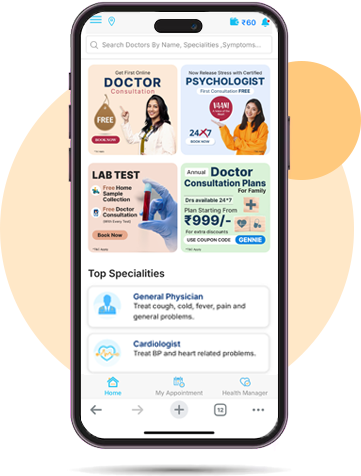Keep in Mind These Key Points to Take Care of Stroke Patients
June 10 , 2023

After getting a stroke, a person needs time and care to recover. Help in getting around, taking medications, eating, and communicating with others. However, each person’s health after a stroke differs.
It's essential to first comprehend the particular needs and condition of a stroke patient in order to know how to care for them at home. Their healthcare practitioner or Neurologist Doctor in Jaipur will let you know about this before they are released from the hospital and will typically provide you with a detailed plan of what they will need to help them recover. Keep in mind that the level of care will vary according on the extent of your stroke's damage. Here are a few typical actions that are frequently included in care plans:
Even if you survive one stroke, it doesn’t end there; it increases the chances of having another one.
Every stroke survivor has different demands. A person may require assistance with:
Depending on their symptoms, arranging medical visits and timely medication administration
- moving while cooking or eating food
- conversing with other people
- doing physical or speech therapy exercises
- obtaining emotional assistance
To help the patient avoid having another stroke, a Neurologist in Jaipur might also suggest making modifications at home. A stroke increases the likelihood of having another one, according to a reliable source. Dietary and lifestyle modifications, such as cutting back on or giving up smoking if a person smokes, can help avoid strokes.
To help the individual suffering from a stroke preserve as much independence as possible, home adaptations could also be required. These modifications may include relocating their bedroom to the ground floor so they won't have to use the stairs.
Help in Mobility Arrangements
Following a stroke, some people experience difficulties moving about or mobility problems. A person's individual needs can be discussed with an occupational therapist or neurologist, but it is typically a good idea to make improvements to the home to lower the chance of accidents. Ask your Neurologist Doctor in Jaipur to help you understand your physical health with the guidance of a physiologist or therapist.
Some modifications might be:
- installing non-slip mats in the shower or bathtub
- putting grab bars in the restrooms
- removing carpets that shift or pose a trip risk.
- making sure that all cords and wires are out of the way.
- shifting their bed to a location that makes moving about simpler, such as the bottom level or next to a bathroom, stabilising tall furniture by anchoring it to the wall
Communicating With Others
Communication-related brain regions can be impacted by a stroke. A person's capacity for speaking and perhaps their capacity for understanding speech may both be impacted by this.
Family members may need to change their communication styles to make it simpler if a person encounters these difficulties. The following can be useful:
- Use concise, basic sentences.
- Instead of open-ended inquiries, use "yes or no" ones.
- Use verbal and hand gestures.
- Reduce the amount of background noise and other distractions.
- Use a board or app for communication that allows users to point at words or images.
- Do not abruptly switch topics.
Intake of Food and Liquids
Some stroke survivors might require assistance with food preparation, chewing, or swallowing.
A person may need to make little or considerable changes to their diet to make food easier to swallow, depending on the difficulties they encounter. These can range from trying an all-liquid diet to chopping up their usual dishes. Before making dietary modifications, it is vital to speak with the best neurologists in Jaipur about the individual's needs, as the adaptations differ from person to person.
Here are some general pointers that might be useful:
- consuming food or beverages while seated upright
- removing distractions to allow the person to concentrate on eating and utilising straws to make drinking simpler
- distributing beverages in containers with lids to prevent spilling
- balanced intake of calories, nutrients, and water
- serving them soft foods according to the person’s liking, such as bananas, scrambled eggs, yoghurt, etc.
Conclusion
While all these can help curate a balanced and healthy lifestyle for the patient, the most important thing is that the emotional well-being of a person is as important as his physical health. Life after surviving a stroke can be challenging and difficult for the patient. In that case, it is important for the caregiver to be cautious and empathetic towards the patient. To help a stroke survivor, the key traits of a caregiver should include
- Patience
- Respect
- Empathy
- Empowering
- Good communication skills
Due to the latest patterns of lifestyle, people are more prone to diseases like stroke, tremors, or migraines. On Health Gennie, you can find a neurologist online consultation to get a deeper insight into your heart health with the right doctors on call. We are an online doctor consultation app where you can book doctor appointments online with one click.
Disclaimer :
The information on this blog is not a substitute for any professional medical diagnosis or treatment. The blog contains text, images or graphics are solely for informational purpose. Before implementing the information mentioned above, seek the advice of a professional doctor regarding any doubt or question you may have about the medical condition or treatment. Also, take the advice of a professional health care provider before making changes in your health care routine.











